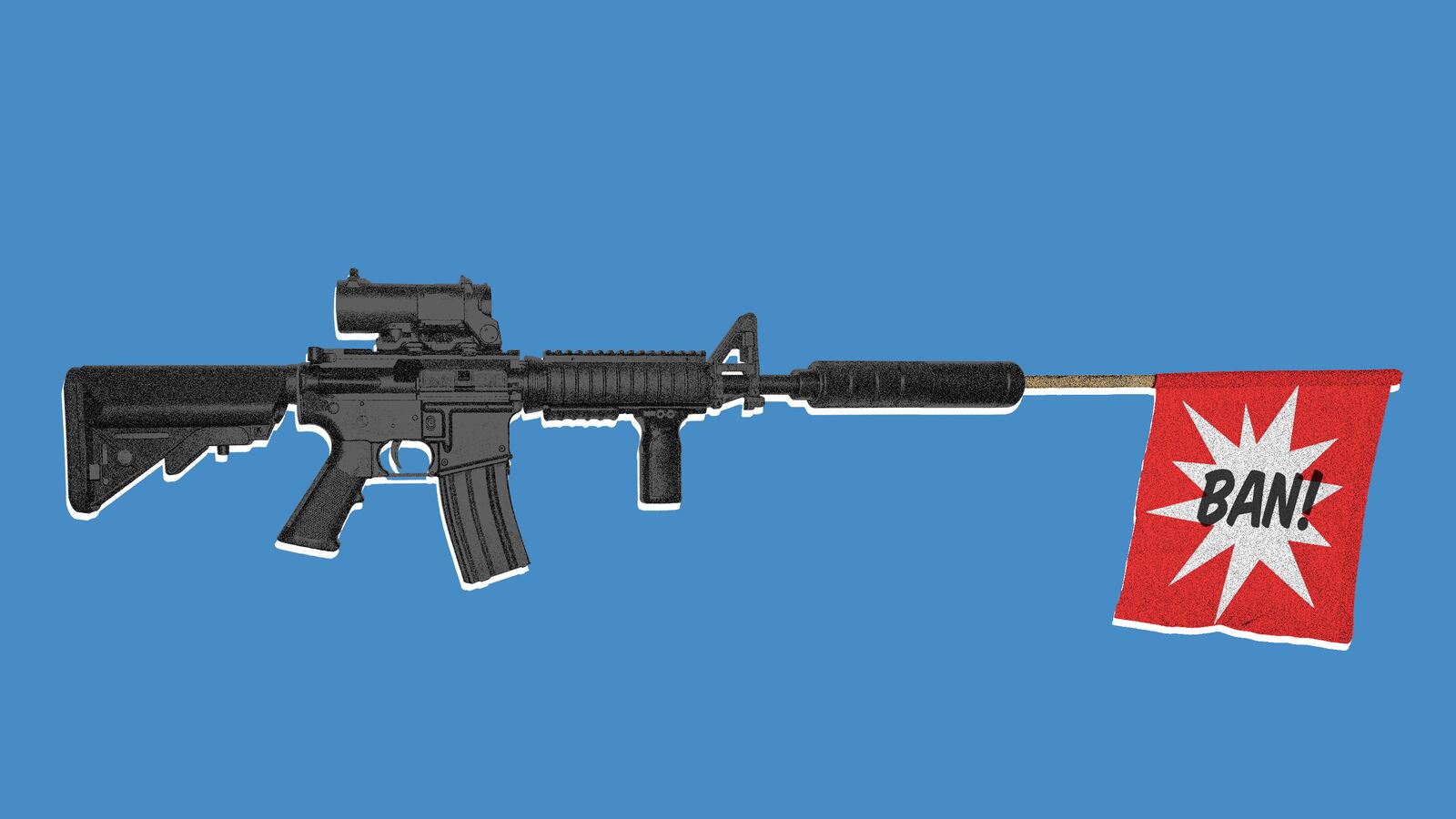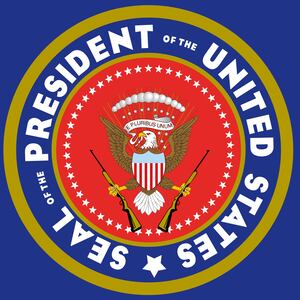In the fall of 1994, as the House of Representatives moved towards a vote on an ambitious and controversial crime bill, Rep. Michael Andrews (D-TX) held a town hall back in his Houston-area district. Tensions had been rising over the Bill Clinton-pushed legislation, in large part because it included a ban on the manufacturing of certain assault weapons. And as he settled in to talk to his constituents, one of them let Andrews know his displeasure.
“A guy pulled up in the pickup truck. Painted on the back of the truck, in hand painting, were the words: ‘You can take my guns and I can kick your ass. That is my constitutional right,’” Andrews recalled.
Needless to say, it was eye-opening. “I was like, ‘Holy cow. This can’t be happening,’” said Andrews. “But it underscored how people take this issue and just go crazy about it. They just go off in all kinds of directions.”
Andrews would end up voting for the ‘94 crime bill, which included the assault weapons ban. But like many of his Democratic colleagues, he wouldn’t stick around much longer after that. He ran, and lost, a primary for the U.S. Senate. Others who voted for the bill suffered more ignominious fates, with the midterm cycle proving disastrous for Democrats.
A quarter-century later, Congress once more finds itself weighing the merits of an assault weapons ban as it grapples with what type of legislative responses it should push in the wake of dual mass shootings—one in El Paso, the other in Dayton. Democrats on Capitol Hill insist that support for the idea is growing, in part because of the number of high-profile shootings involving those types of weapons. According to law enforcement, the gunman in Dayton used a modified military-style pistol while the gunman in El Paso used an AK-47 rifle variant.

AK-47 semi-automatic rifle (no caps, prob. Russian or former Soviet bloc-made), 1 of 19 models targeted in Capitol Hill ban on assault weapons.
Terry Ashe/The LIFE Images Collection via Getty Images/Getty ImagesBut while kernels of progress have been evident around ideas like expanded background checks and red flag laws, virtually no one expects a re-institution of the AWB, which lapsed in 2004 and has not been law since. Memories of 1994, after all, still linger.
“I think it is habitual,” said Dan Glickman, who lost his Kansas seat in ‘94 because, he says, of his vote for the assault weapons ban. “I don’t think the intensity is as great against [restating] the assault weapons ban, but I think the people who want to change it have fallen into the habit of thinking it just won’t happen.”
Virtually every Democrat running for president in 2020 has called for Congress to pass an assault weapons ban in the wake of El Paso and Dayton. But only three were in office during the 1994 debate: Joe Biden (D-DE), Bernie Sanders (I-VT) and Jay Inslee (D-WA). The stories of how they navigated that vote provide a vivid illustration of how the politics of guns were—and remain—difficult to traverse.
Biden was the chair of the Senate Judiciary Committee at the time and the lead author of the crime bill. He capitalized on that measure to burnish not just his tough-on-crime bona fides but his position that there was a direct correlation between gun violence and the prevalence of guns. During consideration of the assault weapons ban, he argued that if assault weapons weren’t outlawed, they’d become more popular. “You can pull out an UZI in a grocery store, and no one gives you any crap,” he stated. “Bring back the days when we were worried about Saturday Night Specials. Those were the good old days.”
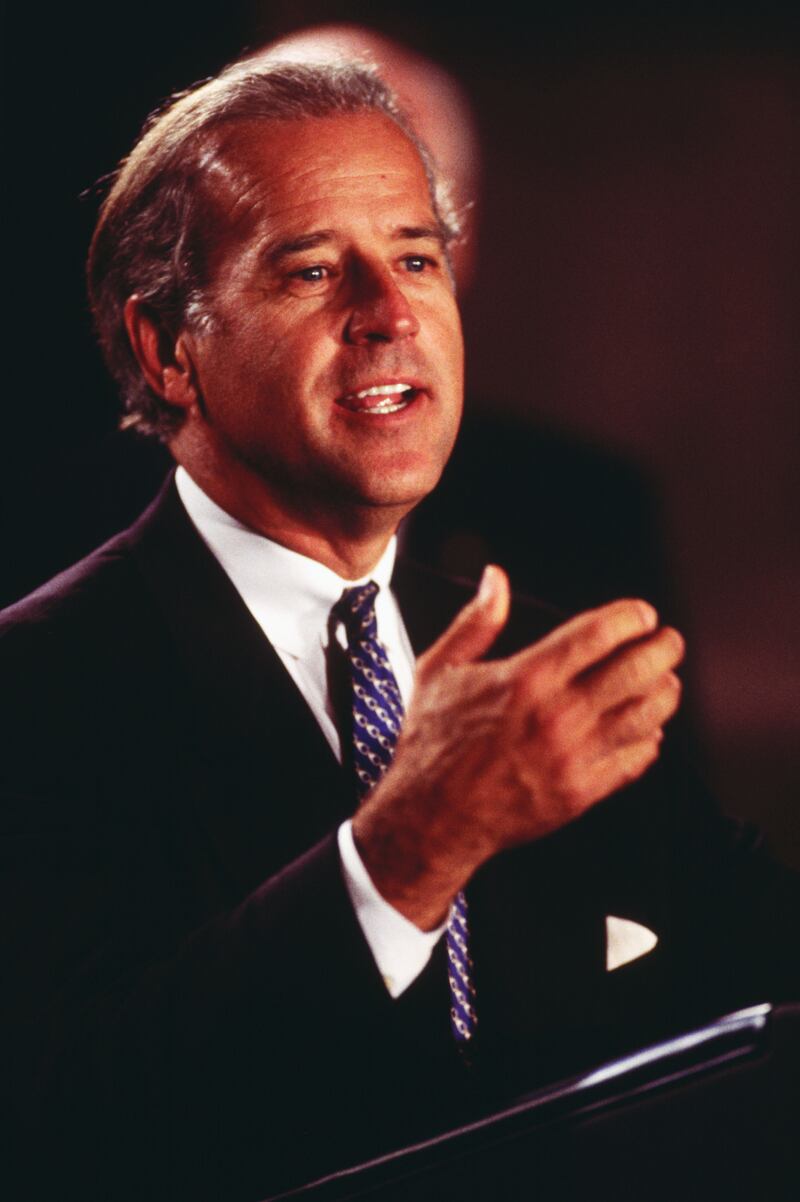
"United States Senator Joe Biden speaks at a Democratic fundraiser in Chicago. The event raised funds for the Democratic National Convention. (Photo by © Ralf-Finn Hestoft/CORBIS/Corbis via Getty Images)"
Ralf-Finn Hestoft/Ralf-Finn HestoftSanders was a two-term congressman from Vermont—caught between his liberal ideology and his state’s pro-gun culture. “Many of the NRA people are working class, middle-income people, and they know that there is no congressman in Washington who has fought harder for the rights of working people, has a 100 percent voting record for workers, than me,” he told NPR in a 1994 interview. “So, I think we're gonna get a heck of a lot of those votes.”
Though the NRA would spend thousands of dollars against him in the subsequent election, Sanders did, indeed, get those votes. But the lessons of the AWB fight appeared to stick with him. As a senator in 2009, he voted against banning guns on Amtrak, arguing that it was critical that hunters in his state be able to bring their firearms on publicly-funded rail.

"Rep. Bernie Sanders, IND-Vt., in October, 1993. (Photo by Maureen Keating/ CQ Roll Call via Getty Images)"
CQ ArchiveInslee was the one who was ousted from public office in 1994. And in a press conference just hours after the El Paso shooting he said it was precisely because he backed the assault weapons ban. “I knew I was gonna lose my seat if I did,” he explained. “I lost my seat. But I have never regretted for one second being willing to ban assault weapons.”
It wasn’t always clear in 1994 if members would have to make that choice. The assault weapons ban, after all, was included almost by accident (after Dianne Feinstein pressed Clinton on it during a Democratic retreat) and was designed as an add-on to a far more controversial piece of legislation. It outlawed a number of specifically named weapons and a series of attributes that—if two more were added—would qualify a gun as an assault weapon. Existing assault weapons were “grandfathered” in, meaning that the ban was merely on the production of new ones. Jim Kessler, who served as then Rep. Chuck Schumer’s (D-N.Y.) legislative director at the time, recalled that the biggest sticking point was whether the AR-15 would fall under the ban, as it was the increasingly preferred weapon of hunters. Ultimately, it did.
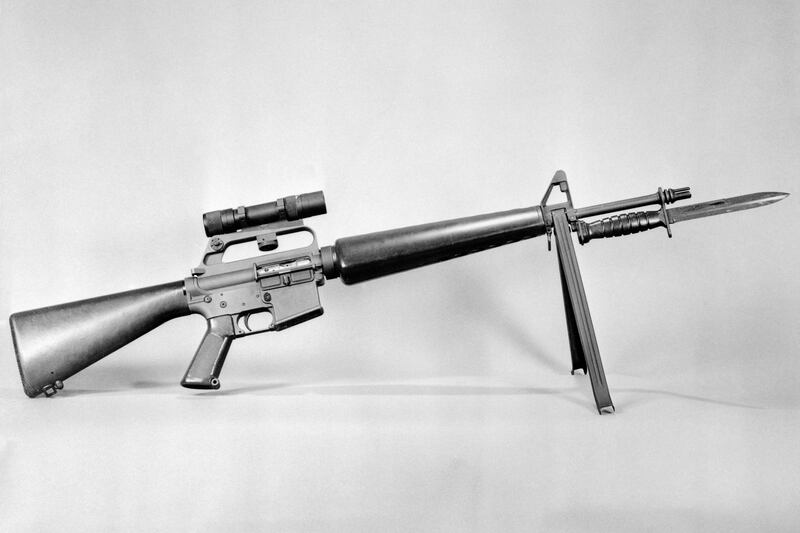
(Original Caption) Washington, DC: The controversial M-16 rifle has won a deadly reputation in Vietnam despite a less-than-perfect performance, Representative Richard Ichord (Democrat - Missouri) said, May 15. Ichord, who heads a special House Armed Services subcommittee which is investigating the weapon, said, \"I'm told that a motto of the Viet Cong is 'Beware of units with black rifles.'\" An AR-15 which, after a slight modification, became the M-16."
BettmannAccording to contemporaneous news reports, the public largely accepted the rationale behind the concept. But as the legislative process moved on, opposition from the gun lobby became frenzied.
“It was like it was paramount to their existence,” recalled Glickman. “They would do anything in the world to defeat a candidate who wouldn’t support them on this.”
Increasingly nervous about the backlash, House Democrats looked for ways to mitigate the damage. Rep. Vic Fazio (D-CA) urged the Clinton administration to sever the assault weapons ban from the crime bill and to have a vote on both, confident that they would pass. But, he recalled, “it was decided by Clinton and [Leon] Panetta that we needed to combine them. And in doing so, we put a lot of folks on the line... In really strong gun states, it was seen as poison.”
Then-Speaker Tom Foley (D-Wash.) privately lobbied Clinton to axe the ban, even as he publicly supported the larger measure. And in negotiations, officials put a 10-year sunset on the ban in order to placate Rep. John Dingell (D-MI) and others.
“It was how we could assure passage,” recalled Clinton’s chief congressional liaison, Patrick Griffin. “There was no policy rationale.”
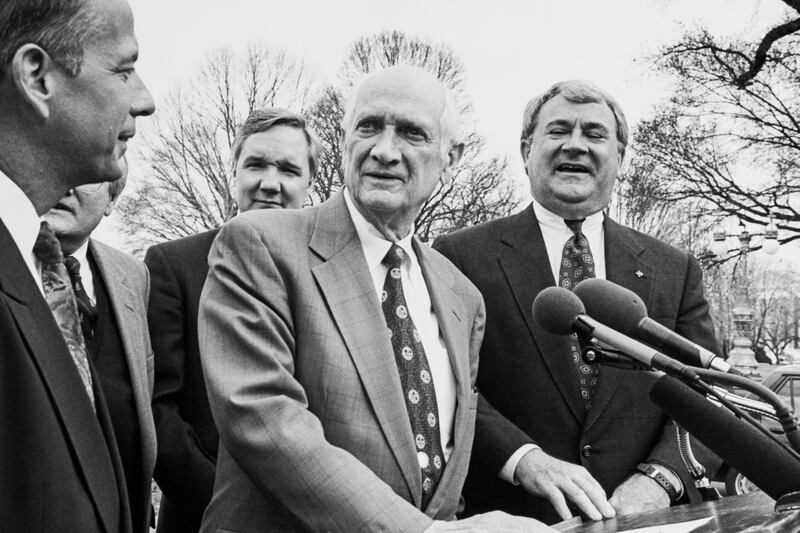
"Rep. Jack Brooks, D-Tex., Rep. Frost, Rep. Green, Rep. Bryant and Senate candidate Jim Mattox during member endorsement on Mar. 28, 1994. (Photo by Laura Patterson/CQ Roll Call via Getty Images)\"r\"n"
CQ ArchiveWhen the crime bill passed both chambers, it went to a conference committee between the House and the Senate. There, Rep. Jack Brooks (D-Texas), the chairman of the House Judiciary Committee, introduced a provision to strip out the assault weapons ban entirely. But his Republican counterparts knew he was doing so to assuage gun owners in his East Texas district and they helped killed the measure—thus leaving the assault weapons ban in the final version and sealing Brooks’ fate.
The congressman called Griffin shortly after the crime bill passed. “Well,” he told him, “you just lost me my seat.” Months later he was out, after 42 years in office.
Foley, too, lost his seat in the 1994 elections. And the shock of a House Speaker succumbing to defeat—along with the historic losses elsewhere—shook Democrats. They went searching for people and issues to blame and settled, to a large degree, on the assault weapons ban.
“The NRA was an unforgiving master: one strike and you’re out,” Bill Clinton would write in his 2004 autobiography, My Life.
In recent years, however, the party has reconsidered whether that history is as much fact as lore. Kessler, for one, says that it is undoubtedly true that the NRA played a role in helping defeat Democrats. But he also argues that the gun group fed the mythology that the assault weapons ban was a huge ballot-box force since it served their organizational interests.
“One of the reasons guns is considered such a big reason for Democrats’ loss in 1994 is that the other organizations and interest groups who hurt Democrats did not want to take credit for it,” he said, referencing, among others, the health insurance industry that went after Democrats for Clinton’s failed health-care reform push. “They were the first to claim credit and it stuck.”
Having worked on gun control policy for decades, Kessler was not pollyannaish about the current state of legislative affairs. But he did argue that the politics of the assault weapons ban were changing. So too did Inslee, who made the case that Republican lawmakers would be the ones who find it increasingly difficult to make the electoral argument on assault weapons.
“This country's had a bellyful and enough teardrops to fill an ocean since [‘94],” Inslee told The Daily Beast. “This country is ready for common sense gun conversation. We will defeat Republican candidates who are toadies for the NRA. We are defeating Republican candidates who are toadies for the NRA.”
And yet, it is clear that the appetite for reinstituting the AWB is far from overwhelming. When Congress last considered major gun legislation—following the Sandy Hook tragedy in 2013—the assault weapons ban was offered as an amendment but fell far short of the 60 votes needed to pass. This week, Senate Majority Leader Mitch McConnell (R-KY) made no mention that the provision would be among those debated or considered when Congress reconvenes.
Twenty-five years may have passed since the ban first went into effect. Fifteen years may have passed since it lapsed. But to this day, people won’t let lawmakers forget that vote.
“I got a call about it last year,” Andrews said. “This guy said, ‘I want you to know that after that vote, I went out and joined the NRA and signed up a thousand new members.’ I’m sitting there thinking, ‘This isn’t a joke!’ Then I start thinking, ‘This guy knows where my office is and has my phone number and may be downstairs.’ We talked for 10 minutes and it ended up being a nice call. But it just shows you how emotional that issue really was.”

